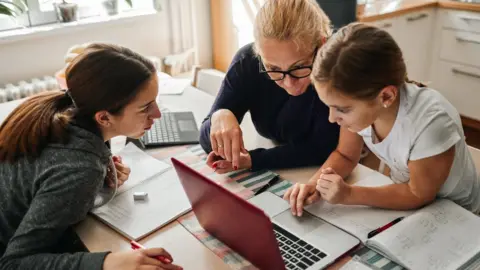Coronavirus: Better-off children 'studying more than poorer pupils'
 Getty Images
Getty ImagesChildren from wealthier families are spending more time each day studying in the coronavirus lockdown compared with the poorest, according to new research.
A survey of families in England suggests better-off children will have studied for around seven days more than their poorer peers by next month.
Children in the highest-income families spend six hours a day on education, but the poorest spend four and a half.
The government said it will do whatever it can to ensure no child falls behind.
The study of more than 4,000 families, carried out for the Institute for Fiscal Studies (IFS), found the gap in time spent on education activities was slightly bigger for primary age children than older pupils.
Whatever their income, more than half of parents said they were finding it hard to support their children learning at home.
Nearly two in three (64%) of secondary pupils in state schools from the richest households are offered some form of active help, compared with 47% from the poorest fifth of families, the study suggests.
Fewer resources
The new analysis from the IFS found that children from more disadvantaged families have fewer educational resources and parental support for home learning.
The research also found poorer children were less likely to have a place to study.
Less than a third (29%) of parents in the poorest families said they would send their child back to primary school given the choice, compared with 55% of the most affluent parents.

- RISK AT WORK: How exposed is your job?
- SCHOOLS: When will children be returning?
- THE R NUMBER: What it means and why it matters
- LOOK-UP TOOL: How many cases in your area?

Ministers have said some primary school pupils in England should be able to go back to school next month.
But teachers' unions have raised concerns over safety amid fears a rush to return to the classroom could spread the coronavirus in schools.
Paul Whiteman, head of the National Association of Head Teachers, said teachers want to see pupils back in class - but they want to understand the scientific reasons as to why the government has said it is safe to return.
"Explain why and if you can pass that confidence test there will be no shortage of enthusiasm from members of the NAHT to bring children back into the classroom," he told BBC Radio 4 Today's programme.
Culture Secretary Oliver Dowden told BBC Breakfast that public safety was the "number one consideration" for the government, and ministers will "continue to engage with the concerns... that teachers have".

- RESTRICTION CHANGES: What will happen next?
- LOCKDOWN SHOWDOWN: Four households go head to head

Researchers have called on the government to address the disparities between children from different backgrounds during school closures, as they warn the crisis is likely to widen attainment gaps.
Lucy Kraftman, research economist at IFS and co-author of the report, added: "These differences will likely widen pre-existing gaps in test scores between children from different backgrounds."
A Department for Education spokeswoman said: "We will do whatever we can to make sure no child, whatever their background, falls behind as a result of coronavirus.
"We have set out plans for a phased return of some year groups from 1 June at the earliest in line with scientific advice."
